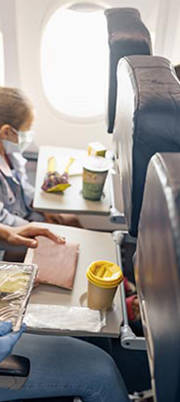
Safe travels: How to prevent infections from spoiling the fun
Posted 29 May 2023 | Source: https://www.happiesthealth.com/
Avoiding unhygienic food and water, getting vaccinated and carrying a medicine kit are a few measures to prevent infections while travelling
‘To travel is to live’ is the mantra for adventure junkies who find travelling to new destinations exhilarating. However, venturing into unknown places might bring along an uninvited guest– infectious diseases. Pathogens lurk in the most common places, be it food, water or air, and can spread infections, wreaking havoc on your travel plans.
A few years back, a business trip to Delhi went awry for D B Dutta, a 65-year-old marketing executive and frequent flier from Bengaluru. “I got a stomach infection after consuming the breakfast provided by the airline. Now, I avoid packaged food to travel safe,” shares Dutta.
Travelling to different areas and encountering a diverse crowd can give rise to infectious diseases, mostly due to lack of hygiene. Different destinations carry different risks of infection. Happiest Health spoke to experts who provide tips to employ proper measures for safe travels, taking the pandemic as a period of learning.
Infectious diseases that spread during travel
“It is not uncommon for travellers to experience an upset stomach or flu-like symptoms, which can be easily prevented with simple precautionary measures,” says Dr Rahul Pandit, a critical care specialist at H N Reliance Foundation Hospital, Mumbai, adding that travel-related infections mostly spread through water compared to air.
According to Dr Swati Rajagopal, an infectious diseases specialist at Aster CMI Hospital, Bengaluru,travel-related infections can spread in the following ways:
- Food and water : Consuming contaminated food and water can cause complications like coli associated diarrhea, shigellosis (contagious intestinal infection accompanied by diarrhea), giardiasis (small intestine infection caused by a contagious parasite) and hepatitis A. Warmer climate increases the risk of diarrheal diseases like typhoid and cholera.
- Air : Viruses like SARS-CoV-2 and influenza virus can spread through air. When people with certain conditions cough, sneeze or talk, bacteria or viruses travel through the respiratory droplets and can linger in the air or cling to surfaces. Breathing in the air or touching the eyes, nose or mouth after touching the surface can cause transmission of these microorganisms, thereby affecting another person.
- Other vectors : Infections spread through vectors are area-specific. For instance, travelling to a region with high prevalence of mosquitoes increases the risk of infections like dengue and malaria. Other vector-borne conditions include Zika and Lyme disease (a contagious bacterial infection caused by tick bites).
Ways to avoid infections and travel safe
Preventing traveller’s diarrhea
While savouring different cuisines in new places can be exciting, it might also lead to traveller’s diarrhea, a digestive tract infection that commonly causes loose stools and abdominal cramps.
“It is caused by water-borne infection and can occur anywhere in the world. Symptoms include passage of three or more watery stools a day,” says Dr Rajagopal. She lists out some other symptoms, which include:
- An urgent need to defecate
- Abdominal cramps
- Nausea
- Vomiting
- Fever
Dr Pandit lists some guidelines to prevent traveller’s diarrhea and stresses the importance of following them before consuming food and drinks:
- Go for packaged water bottles or boil the water to kill pathogens. “If you are using a portable water filter, make sure that the pore size is small enough to remove parasites. However, most portable water filters do not remove bacteria or viruses,” adds Dr Rajagopal.
- Hand hygiene is a must. Use hand sanitizer or clean soap and water.
- Eat food which is covered and freshly cooked. Avoid cold and unhygienic food.
- Carry a medicine kit which will keep you prepared for any unanticipated events.
Travel medicine kit: What should you carry?
A travel medicine kit must contain medicine for diarrhea, disinfectant tablets, anti-allergy medication and antiseptic creams for wounds and cuts.
“This should be in addition to regular medication that one takes for general medical ailments like an upset stomach, nausea and fever. To prevent insect-borne conditions, carry long-sleeved shirts, full pants, mosquito repellent creams and sprays,” advises Dr Rajagopal.
Vaccination: Consult your doctor before travel
Being up-to-date with vaccinations is vital to prevent area-specific infectious diseases. “If one is travelling to African countries, taking the yellow fever vaccine is mandatory. If you’re travelling to an endemic country with malaria, you can take a malaria prophylaxis tablet. If you are a senior citizen or have comorbidities, a yearly flu shot will help you decrease the severity of a flu,” says Dr Pandit.
He further advises consulting your general practitioner to be updated with vaccinations at least four to six weeks before the date of travel.
“A vaccine taken four weeks in advance becomes effective by the time you’re travelling,” explains Dr Pandit.
Lessons from the pandemic
Dutta is a conscious traveller who takes concrete steps to avoid infectious diseases. He carries medicines like paracetamol and antacids for emergencies like fever and an upset stomach. “I use masks and sanitizers. I only drink bottled water,” he says.
Dr Pandit believes that the pandemic inculcated discipline in travellers. “Previously, people with fever or cough were not hesitant to travel to another city. With COVID, everyone developed a sense of social responsibility to prevent the spread of infectious diseases, whether through COVID-negative certificates, quarantine or simple hygienic practices like masking,” he says, adding that travellers being responsible has not only reduced the number of COVID cases, but also of other infectious diseases.
Takeaways
- Travelling is exhilarating, but new destinations can be a hub of infectious diseases if proper precautions are not taken.
- Avoiding unhygienic food and water, being vaccinated and wearing mosquito-repellent creams are a few measures to prevent infections and travel safe.
- It is vital to consult your doctor before travelling for the sake of your own health as well as your co-passengers.
